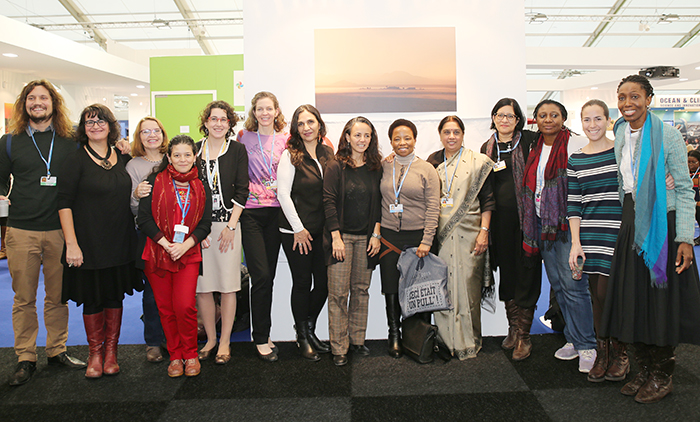PARIS, France (Dec. 9, 2015) – Gender Day at the Rio Conventions Pavilion followed a day after the UNFCCC Gender Day, around the theme of “A Look Ahead to Achieving Agenda 2030 – Advancing Gender Equality and Women’s Empowerment in the Face of Environmental Change”. WEDO helped bring a civil society voice to the panels, both as a speaker and a session coordinator. The four sessions of the day were focused on the road ahead, to support the achievement of sustainable development goals relating to gender equality and environmental sustainability – including through shared objectives of the Rio Conventions and other organizations.
In the final session, an interactive discussion on “Exploring Synergies in the Rio Convention to Support Achievement of the SDGs” with the Green Climate Fund, the Rio Conventions (CBD, UNCCD and UNFCCC), the GEF and UNDP, Eleanor gave a brief update on the negotiations at the moment gender equality was first been lost from Article 2. During the broader conversation, speakers acknowledged that implementation of gender mandates is an overarching challenge, even when national plans and projects include gender-specific language. Eleanor particularly highlighted the important role civil society (including the official women’s spaces such as the Women’s Major Group for sustainable development & Women and Gender Constituency) and women’s groups can play in coming up with and implementing climate solutions and sustainable development plans – as well as in linking them up in design and in action. The Conventions noted that finding time to collaborate is challenging, and pledged to have more regular conversations going forward, while funding is a struggle for all.
Session 1 brought forth the evidence base, session 2 addressed land rights, and session 3 shared lessons from the field in adaptation and disaster risk reduction. The third session had a strong voice from civil society to show what women’s groups are already doing, as well as challenges they are facing. Members of the WGC and the WMGs for sustainable development and disaster risk reduction (Hauirou Commission, NAACP, All India Women’s Conference and Action Aid) shared the panel with the CBD and CIFOR, addressing issues of power structures, patriarchy and participation, alongside reproductive health, food production and infrastructure.
A full description of the day’s events is available from IISD, http://www.iisd.ca/download/pdf/sd/enbplus200num27e.pdf



